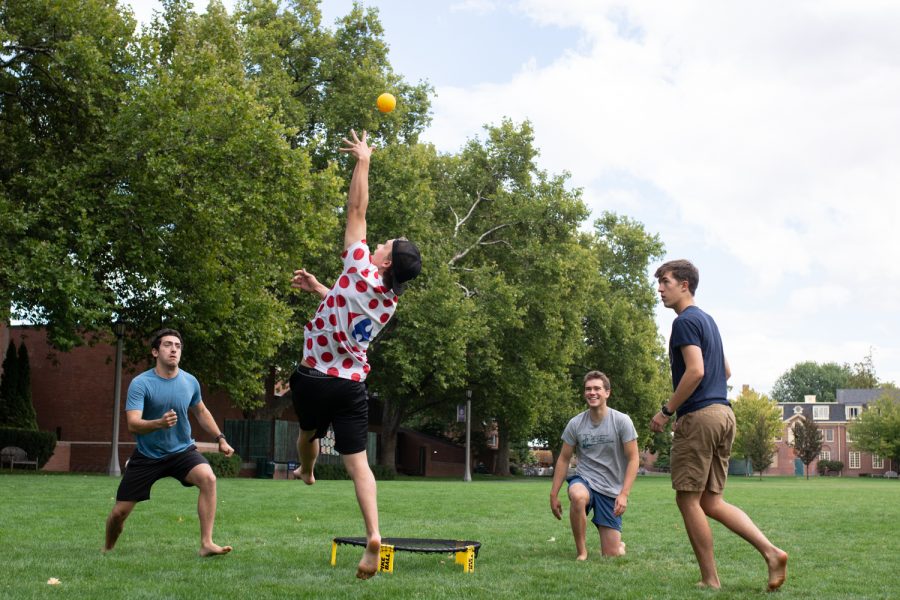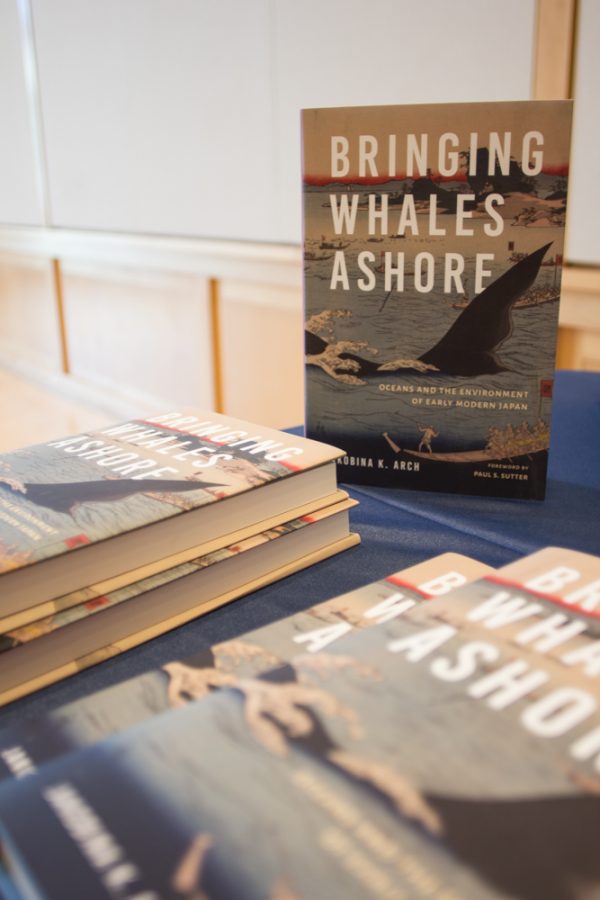Last week’s classes were primarily dominated by preparation for PII’s annual speech contest, a much celebrated feature of PII’s curriculum. Every PII student, both 2nd and 3rd year, had to compose a five-minute speech on a topic of their choosing and speak in front of their classmates and professors on Wednesday. Listening to my classmates’ speeches for three hours was definitely more interesting than the methodical monotony of our daily lessons on “Spirited Away” (although the subject matter is interesting, classes have become incredibly formulaic, and we repeat the same activities in the same order every day). The topics ranged from the superficial to the profound, from a retelling of a famous Japanese ghost story to a discussion of a radical leftist interpretation of The Holy Bible. I spoke about getting lost in Japan and how losing my way and asking for directions has taught me how to appreciate small acts of kindness. Although my speech was well-received and I feel that I performed well, I was not selected to continue to the next and final round. I felt kind of relieved not to be selected, to tell you the truth, as continuing to the next round would simply have meant added stress due to necessary extra preparation.
On Friday, all the PII students gathered in Rifare’s largest classroom for the speech contest finals. Four 3rd years and six 2nd years made the finals. My friend and fellow 3rd year student Teng Kuan Ng, a graduate student at Harvard, ended up taking first prize after presenting a fascinating speech about his relationship with movies and how film has shaped his life. Second prize also went to a 3rd year, my friend Kelly Maeshiro, who gave the aforementioned speech on the leftist radical interpretation of The Holy Bible, which was incredibly fun to listen to. Lastly, a 2nd year took third place with a touching speech recounting her disappointment upon realizing that hugging, her favored expression of affection and comfort, is not commonly practiced in Japan. The rumors of cash prizes for the winners of the speech contest turned out to be unfounded; the three winners received Japanese dictionaries, the runners-up books of Japanese proverbs and Haruki Murakami novellas.

The family and I kicked off the weekend by attending Ha-chan’s preschool summer festival, which was just as adorable as it sounds. Ha-chan was very excited for his class’s demonstration of taiko drumming, which he and his classmates performed with a wealth of enthusiasm, if not precise rhythm! After the taiko performance, the parents and preschoolers all danced together to some traditional festival music before the children dispersed to play carnival games and eat ice cream. I was the only foreigner present at the festival, and therefore received a lot of stares from parents and children alike. A group of little girls approached Ai-san shyly to ask whether I was a model friend of hers (Ai-san occasionally models as a side job, as I discovered recently). “She looks Italian!” they giggled, “She’s so tall!”



After the festival we went out for sushi at the family’s favorite conveyer-belt style sushi restaurant, the boys excitedly clutching the prizes they had won from the carnival games. Later that evening, Ai-san dropped the boys off at a Boys’ and Girls’ Club-style kids center, where they would spend Friday and Saturday night. As both Masa-san and Ai-san were busy with work obligations all weekend, they could not care for the boys. I wondered, not for the first time, whether hiring babysitters is as common in Japan as it is in the United States. Ai-san seems to leave the boys home alone quite frequently, despite the fact that they’re still very young. It seems like the boys don’t go to their dad’s house unless they’re spending the night. Perhaps all of the Japanese middle-school and high-school girls are too busy with their studies to spend time babysitting!
Ai-san and I woke up rather early on Saturday. Ai-san had an all-day commitment with a modeling side-job, preparing to film a commercial advertising a ryokan. I went to Rifare to study, which before too long turned into watching anime on my laptop in the IFIE library. As the semester draws to a close, our homework load has mercifully decreased, giving me some time to relax for once. Around 5:00 PM, I departed Rifare and headed to the Ishikawa Prefectural Noh Theater to watch a Noh play.
The Noh performance began with a brief comic play, the title of which was translated as “A Demon for Better Working Conditions” in the English program. It told the story of a long-suffering field worker who dresses up as a demon in order to frighten his master into giving him job benefits (among the multiple requests: a mosquito net to sleep under, and plenty of wine to drink). Although the master is at first terrified and agrees to the demon’s demands, he soon catches on to the field worker’s trick and unmasks him. I found the play incredibly charming and funny. Thankfully, much of the humor of the play transcended issues of translation, and I laughed as much as the Japanese viewers to my left and right.
The second play was…there’s no other word for it, boring. The second play, “Irises,” was a more serious performance telling the story of a wandering monk who, while traveling through the countryside, is stuck by the beauty of the blooming irises by the side of the road. Moved, he composes a poem in honor of the flowers. Suddenly, a beautiful woman appears and tells the monk that she is the spirit of the irises. Impressed and inspired by the monk’s beautiful poem, she performs a dance in gratitude. Although the plot was fairly straightforward, this story took at least an hour and a half to reenact. For those unfamiliar with Noh, the actors speak in a kind of wailing song-like manner. Think of Dory trying to speak Whale in Pixar’s Finding Nemo…in Japanese. In this particular play there were long stretches with no dialogue at all–just the whoops and moans of the accompanying musicians on drums and high-pitched flute. I began to wonder whether Noh got its name from the yowling of the actors and musicians; it sounded like they were saying, “Nooooooooooooh! Noooooh!” over and over again.
About halfway through “Irises,” the beautiful Iris Spirit appeared from stage left. She was very apparently an overweight, middle-aged man (Noh actors are exclusively male). Behind the expressionless Noh mask, the Iris Spirit’s jowls quivered. I nearly lost it when the PII student sitting beside me turned in my direction and mouthed, “Hot!” It took the Iris Spirit another 20 minutes before “she” began her dance of gratitude, which was an incredibly anticlimactic affair. The “dance” was more of a slow, circular progression around the stage. As the Iris Spirit paraded around, occasionally pausing to briefly lift her arm or engage in some other astonishing display of dance prowess, I glanced around the audience. Many of the viewers had fallen asleep. Since the average age of audience members seemed to be around 60, I wasn’t really surprised until I returned my gaze to the stage and saw that the actor playing the monk had also closed his eyes for a brief snooze while the Iris Spirit performed her dance.
Although Noh has a fascinating history, and its continuation of practice into the modern era is nothing short of astounding, I must confess that I much prefer Shakespeare, the Western world’s contribution to the theatric arts that has been in practice not quite as long as Noh. “A Demon for Better Working Conditions” certainly had merit and was entertaining, but “Irises” proved a bit too long for my taste!
On Sunday, Ai-san and I picked up the boys from the children’s center and we went to the Toyama Family Park, which turned out to be a zoo! The Family Park had a great petting zoo (although both Ha-chan and Rei-chan were afraid of the goats) and featured many animals native to Japan. Two highlights of the zoo trip: 1) I had the opportunity to feed horse meat to a wolf, which was really, really cool. I love all kinds of canines, and I had never been so close to a wolf before in my life. I came away from the experience thinking, much as I had in my childhood, how awesome it would be to have a pet wolf. 2) Re-chan held my hand throughout the duration of our zoo trip. It was incredibly cute at the time, but I didn’t realize how significant the gesture was until later, when Ai-san told me that he has never held hands with a visiting student before. “He’s usually so shy!” she said, “He’s never warmed so much to an exchange student before now.”


I fell asleep in the car on the way home. The PII classes have definitely taken their toll; I have hardly felt so exhausted in my life, even though classes are now winding down.
After Re-chan and Ha-chan had gone to bed on Sunday, Ai-san and I went out for drinks with one of her friends. Even though it was a school night, I wasn’t going to pass up the opportunity to spend time with Ai-san and meet a friend of hers! We went to a bar whose name, “St. Louis Jigger Bar,” had long intrigued me. I have passed by it often on my way to and from extracurricular activities, and it has always looked really swanky. The Jigger Bar didn’t disappoint. Ai-san and I treated ourselves to delicious cocktails made with orange juice and rum, and snacked on sliced vegetables while the immaculately dressed bartenders swept around the bar, refilling our glasses as soon as they heard the sound of ice in our empty glasses. Her friend, as designated driver, had a ginger ale. Ai-san’s friend was really interested in American perceptions of Japanese foods, and was surprised to learn about the popularity of instant ramen noodles among American college students.
After such a fun weekend, it was really hard to return to class, even for my final week with PII. With my final exam on Thursday and graduation on Friday, I only have only a few more days before I have to say goodbye to the Suzuki family. I’ll be very sad to say goodbye to my Japanese family for these past two months, and I’m sure that when the time comes to board my train to visit Mao on Saturday, it will be an emotional parting. I have become very attached to Ai-san and the boys. However, I’m really homesick for my American family and very much looking forward to my reunion with my parents and brother for the remainder of summer vacation.









